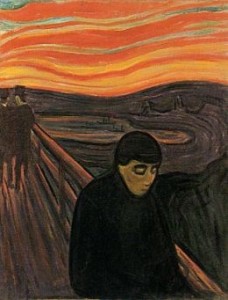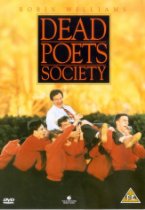
The book as a whole—like life—is brutally realistic, like a crazy, unedited reality show. Usually when we come up against something so honest, we either try to cover it over, conceal it, or brighten it up so it seems less harsh, or we exaggerate it, making it so excessive and terrifying that we can attribute it to fiction, and it no longer seriously threatens us. For instance, in the first case we might start to make jokes, or deny it by saying, “Well, it’s not really that way…” The second case is more like a horror movie, or a Stephen King novel, where we take a common fear and blow it up into a terror extravaganza, where everyone is a despicable beast, and then we can more easily shrug it off. Either way, we avoid dealing with it and we can sleep at night.
About the book of Ecclesiastes, novelist Thomas Wolfe (Look Homeward, Angel, Of Time and the River, et al.) wrote: “Ecclesiastes seems to me the noblest, the wisest, and the most powerful expression of man’s life upon earth. Ecclesiastes is the greatest single piece of writing I have ever known and the wisdom expressed in it the most lasting and profound.”
“ ‘Meaningless! Meaningless!’ says the Teacher. ‘Utterly meaningless! Everything is meaningless.’ ”
Do you ever get the feeling that nothing matters, and that your life is empty? It’s a horrible hole in the pit of your stomach. A night of fun with friends can make it go away, but when we wake up in the morning, it’s back. Alcohol, or drugs, or sex can make it go away, but it always comes back—we feel the nothingness. We start to think reality is insubstantial and all truth is a lie, so we have to make up our own truth and stick with it; activity is useless; security is deceit, and we might as well be living in a dream world. It’s all a vile illusion, like working at Disneyland. Sean Smith writes, “At first, you can’t believe that you get to spend every day in The Happiest Place on Earth. Everyone wants to ask you about your work. You’re surrounded by princesses, and the sky sparkles with pixie dust. But as the years go on, you learn about the oily machinery that manufactures all that enchantment. You see what Cinderella’s really like when that glass slipper comes off. And then one day you notice that the magic is gone, and all you’re left with is a small, small world.”
Ecclesiastes 1.3: “What does man gain from all his labor at which he toils under the sun?” Ultimately, what sense does it all make, and what do we get out of it? What it feels like sometimes is we’re born, we go through senselessness and suffering, and then we die. And what is the sense of that? So we’re at the top of evolutionary chain, and this is all it is? Why should I get out of bed on Monday morning and get back on the meaningless treadmill of life? Where is this all taking me, and why am I doing it? Despite that we are active to the point of exhaustion, there is no lasting satisfaction.
“There is nothing new under the sun.”
Verse 9: “What has been will be again, what has been done will be done again; there is nothing new under the sun.” Endless repetition; monotonous sameness. Without God, history is a closed circuit and life is a closed system, and at core, then, it’s a dull and painful meaninglessness.
Verse 10: “Is there anything of which one can say, ‘Look! This is something new’? It was here already, long ago; it was here before our time.” He is not talking about science, medicine, industry or technology. He is talking about humanity. Look at the Renaissance, the Middle Ages, the Roman Empire, the Babylonian Empire, or even ancient Egypt. Are we as humans any different than we used to be? Not a bit. There may be progress in the sciences, but not in the soul.
 Have you seen the movie “Dead Poets Society”? On the first day of his class, the teacher, John Keating, takes the bewildered students out of the classroom, shows them the photo of the alumni of classes long gone by, and says:
Have you seen the movie “Dead Poets Society”? On the first day of his class, the teacher, John Keating, takes the bewildered students out of the classroom, shows them the photo of the alumni of classes long gone by, and says:
They’re not that different from you, are they? Same haircuts. Full of hormones, just like you. Invincible, just like you feel. The world is their oyster. They believe they’re destined for great things, just like many of you. Their eyes are full of hope, just like you. Did they wait until it was too late to make from their lives even one iota of what they were capable? Because, you see gentlemen, these boys are now fertilizing daffodils.
Why all this morbid talk? Sometime or another we have to stop the game and speak the truth about how life really seems to us. Too often the church, or Christians, are guilty of the denial I mentioned in the first paragraph. But the Bible doesn’t skirt or minimize the truth—either the pain or the glory.
I’d love to hear your comments.

To have any impact, you are going to quite possibly have to piss someone off. This merry go round of meaninglessness is only going to be stopped by those who have the courage to either jump off or make it go faster and more interesting.
I agree with that sentiment, Wes. It’s impossible, particularly in this era, to speak the truth and not upset a lot of people. We have to speak the truth with precision, courage and conviction.
Wrong Thomas Wolfe, I am afraid. The one who said what you quoted was a far greater writer!
Thank you so much for that correction! I will make the change in my study. I appreciate you taking the time to write to me.